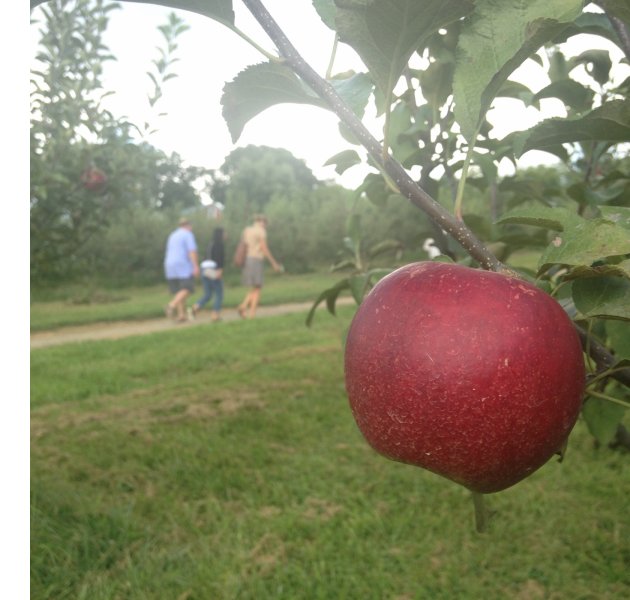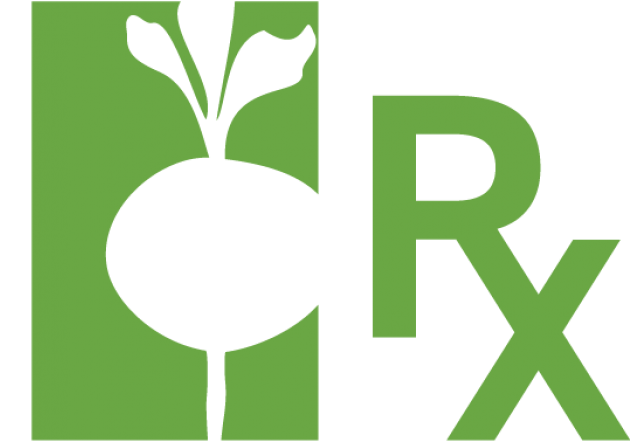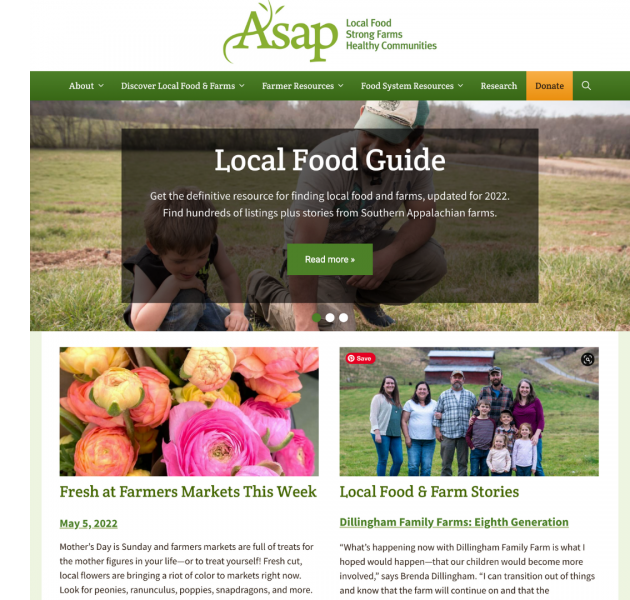|
|
|
monthly news from ASAP | MAY 2022 | asapconnections.org
|
| |
|
|
Celebrate 20 Years of ASAP
|
Join us this week for a party marking ASAP's 20th anniversary!
WHEN: May 25, 4-6:30 p.m.
This is a free event with market board snacks from Red Fiddle Vittles featuring local farms and makers (full list to come) and beverages from Wicked Weed Brewing, Vidl Wine, Burial Beer Co., Noble Cider, Plēb Urban Winery, Shanti Elixirs, and Buchi. Plus, live music from Pixiebilly, on-the-farm fun, and raffle prizes from Biltmore Estate, Hickory Nut Gap, Eda Rhyne Distillery, and more! A toast to ASAP's history and founder Charlie Jackson’s retirement will take place around 5 p.m. (Read more from Charlie about ASAP's early years in the Faces of Local interview below.)
You do not need to RSVP to attend. Families are welcome, but since this is a working farm, please leave pets at home.
|
|
 |
Farm Fresh for Health Regional Symposiums
|
 Throughout the summer, ASAP will present a series of on-farm symposiums for healthcare providers and community organizations in Western North Carolina to highlight the principles of Farm Fresh for Health. Registration will open June 1 at asapconnections.org. Throughout the summer, ASAP will present a series of on-farm symposiums for healthcare providers and community organizations in Western North Carolina to highlight the principles of Farm Fresh for Health. Registration will open June 1 at asapconnections.org.
- Saturday, June 25, 10 a.m.–3 p.m., Winding Stair Farm and Yonder Community Market (Franklin, NC)
- July, date TBA, Perry's Berry's Vineyard and Winery (Morganton, NC)
- July, date TBA, KT’s Orchard and Apiary (Canton, NC)
- August, date TBA, Hendersonville Farmers Market
Each program will feature a different agenda and presenters with attendees joining in discussions around:
- Produce Prescriptions
- Local Food and Nutrition Security
- Workplace CSAs
- Wrap-Around Clinical Health Services
- On-Farm Healthy Food Experiences
- Farmers Market Engagement
Farm Fresh for Health is ASAP's approach to improving the health and wellbeing of communities and supporting local economies. The project builds on the idea that local food systems are intrinsically connected to community health—economic, social, and physical. Local food and farm interactions, such as cooking classes, farm visits, shopping at farmers markets, or participating in a CSA (community supported agriculture), encourage us to eat more fresh fruit and vegetables, get outside, cook more at home, and eat together with friends and families—all of which has the potential to make us a healthier, happier community.
|
|
 |
ASAP's Farm Fresh Produce Prescription Program Expands
|
 After piloting a Farm Fresh Produce Prescription in 2021, ASAP is expanding the program to work with additional farmers markets and local food outlets. Participating healthcare providers can prescribe patients more fresh fruits and vegetables to help treat or prevent diet-related illness. Patients will be able to redeem prescriptions at a farmers market or through a local produce delivery service or a CSA (Community Supported Agriculture) box. After piloting a Farm Fresh Produce Prescription in 2021, ASAP is expanding the program to work with additional farmers markets and local food outlets. Participating healthcare providers can prescribe patients more fresh fruits and vegetables to help treat or prevent diet-related illness. Patients will be able to redeem prescriptions at a farmers market or through a local produce delivery service or a CSA (Community Supported Agriculture) box.
ASAP is currently partnering with MAHEC (Mountain Area Health Education Center) to offer produce prescriptions. Talk to your MAHEC healthcare provider to find out if you are eligible.
Prescriptions can currently be redeemed at the following markets. More locations will be added. Find the most up-to-date list here.
- Asheville City Market, Saturdays, 9 a.m.-noon
- Enka-Candler Tailgate Market, Thursdays, 3-6 p.m.
- Hendersonville Farmers Market, Saturdays, 8 a.m.-1 p.m.
- Mills River Farmers Market, Saturdays, 8 a.m.-12 p.m.
- North Asheville Tailgate Market, Saturdays, 8 a.m.-noon
- River Arts District Farmers Market, Asheville: Wednesdays, 3-6 p.m.
- Weaverville Tailgate Market, Wednesdays, 3-6 p.m.
The prescription incentive provides healthcare providers with action steps that fit within the healthcare process. Social environments significantly impact food choices and are a crucial intervention point to increase healthy eating. Farmers markets naturally offer environments that encourage eating fresh and seasonal fruit and vegetables, cooking at home, and eating together with friends and family.
|
|
 |
Growing Minds Hosts Four Kenan Fellows
|
 Through the Kenan Fellows Program for Teacher Leadership, four educators will work with ASAP's farm to school and other local food programs to build healthy communities and create a product centered around culture and various food commodities in their communities. They will be mentored by Growing Minds Program Director Jennifer Trippe. The fellowships are sponsored by the Dogwood Health Trust. Through the Kenan Fellows Program for Teacher Leadership, four educators will work with ASAP's farm to school and other local food programs to build healthy communities and create a product centered around culture and various food commodities in their communities. They will be mentored by Growing Minds Program Director Jennifer Trippe. The fellowships are sponsored by the Dogwood Health Trust.
- Nichole Efird, Cherokee Central Schools (Qualla Boundary)
- April Parrott, Cherokee Central Schools (Qualla Boundary)
- Emily Willey, Learning Center Charter School (Cherokee County)
- Kathryn Moses, Jackson Community School and Fairview Elementary School (Jackson County)
|
|
 |
ASAP's Website Gets a Redesign
|
 ASAP's new website is live at asapconnections.org! The redesigned site makes it easier to locate and use ASAP's many resources, whether you are a farmer, local food enthusiast, educator, farmers market manager, chef, visitor, or one of the many other members of our community. ASAP's new website is live at asapconnections.org! The redesigned site makes it easier to locate and use ASAP's many resources, whether you are a farmer, local food enthusiast, educator, farmers market manager, chef, visitor, or one of the many other members of our community.
The new website also features local food and farm stories and includes a searchable archive of stories from Growing Local Radio and other ASAP stories. |
|
 |
Job Opening: Market and Events Coordinator
|
ASAP is hiring a full time Market and Events Coordinator. This position helps coordinate operations and promotion of the downtown Asheville City Market; manages ASAP program and fundraising events; and leads ASAP’s volunteer and intern initiatives. Hours are Tuesday through Friday, 9 a.m. to 5 p.m. and Saturdays, 6:30 a.m. to 2:30 p.m. View the full job description and application instructions here. This posting will remain open until filled. Applications only accepted by email. Please do not call or come by the office.
|
|
 |
 20 YEARS OF ASAP 20 YEARS OF ASAP |
| 
We're celebrating ASAP's 20th anniversary! Each month we are sharing the origins one of our programs as well as stories from farmers and others who have been with us along the way.
Growing Minds was one of the first farm to school programs in the country. It started in 2002 as a project at Hazelwood Elementary in Haywood County and now works with schools in 60 Appalachian Grown counties and across the state. Pictured is founding director Emily Jackson in the early years of the program.
Growing Minds helps educators, school nutrition staff, farmers, and community members provide farm to school experiences to students. From 2007 to 2016, ASAP served as the Southeast Regional Lead for the National Farm to School Network.
As the Growing Minds program has grown, so has the national farm to school movement. There are now farm to school programs operating in all 50 states at more than 42,000 schools! ASAP has also been a leader in establishing farm to preschool programming in the region. Growing Minds remains unique as a farm to school program that is part of an organization that is also directly working to support farmers.
|
|
|
|
 FACES OF LOCAL FACES OF LOCAL |
| |  ASAP founder Charlie Jackson is retiring this month. For our Faces of Local interview, we asked him about what led him to farming in Western North Carolina and the organization’s early days. An excerpt is included here. Read more of the interview on our website. ASAP founder Charlie Jackson is retiring this month. For our Faces of Local interview, we asked him about what led him to farming in Western North Carolina and the organization’s early days. An excerpt is included here. Read more of the interview on our website.
Where were you before ASAP?
I was in grad school in Maine and worked with somebody named Helen Nearing. She and her husband, Scott, had inspired a lot of the Back to the Land movement in the ’70s. I was inspired by that and moved back to North Carolina, to Madison County. I was trying to farm. It was tough—not the farming part but the selling part. Asheville was sparsely populated, boarded up. There were no restaurants. It was not a place where you would sell your products. A group of farmers came together and formed Mountain Organic Growers. The idea was that in Western North Carolina we had different seasons from the rest of state. Together we could grow things up here and then ship them down the mountain and have a bigger market. It barely worked. It was logistically expensive. The value of organics wasn't quite what it needed to be. That eventually became Carolina Organic Growers, which was really an early food hub before food hubs were a thing. Then the French Broad Food Co-op opened a farmers market and we sold there. But I wasn’t making a living farming. I was doing carpentry as well. Emily was working in domestic violence shelters. We weren’t making money. We were renting land, and we were never going to own land.
What was the agricultural environment here?
This was the mid-’90s and tobacco was king. But the Back to the Land movement had brought a lot of new people to Western North Carolina in the ’70s who were doing alternative agriculture. A lot were growing pot out in these rural communities. Really, the intersection of tobacco, growing pot, and Back to the Land has a lot to do with where we are now in local food movement. Tobacco had kept farmers farming on small plots of land, but was on its way out. There was a big crackdown on pot growing in the mid ’90s, so we were losing two cash crops. Most people are aware of tobacco, but the other is more forgotten. There was a vacuum and at the same time there was this influx of new people and new ideas.
And ASAP formed in that vacuum?
There aren’t models for what ASAP is. We didn’t know it could be a thing. I convened a group of farmers in Madison County, realizing we were vulnerable. It was some old timers, but mostly new timers. Tobacco was the thing we really had to do something about. We didn’t know it at the time, but seven years later, tobacco would be gone from the region. Local food wasn’t the first thing that came out of this. We looked at transitioning tobacco into organic and farmland preservation. Right at the beginning, in ’95, we did a listening project. A lot of volunteers got trained in how to conduct community interviews, what they saw as challenges, opportunities, what they valued. It was a really good way to get into conversations across generations, families, the from heres and the come heres. People really valued the culture and quality of life in their communities. They liked tobacco because it was steady and seasonal, and those rhythms were valuable. What came through was that they wanted to keep not tobacco but that kind of life.
Probably what moved us forward as an organization was the Master Settlement Agreement [in 1998] that created the Golden Leaf Foundation and North Carolina Tobacco Trust. That legitimized what we were doing and backed it up with some money. In 1995 to 2000 nobody was getting paid. We were all just doing it because we wanted to see this change. There was no reason to think we could create an organization and survive. It was stupidity, but I really wanted to do something other than carpentry on the side. I said I’m willing to put in a couple of years to see if we can do something with this. These funds brought opportunity at a whole other scale than we could have imagined. So [in 2002] we formed a board, filed the papers, and signed them outside in a parking lot.
Read more of the interview online.
|
|
|
|
 RECIPE OF THE MONTH RECIPE OF THE MONTH |
| |  Cucumbers are coming in at farmers markets and in CSA boxes! Here's a refreshing way to use them that appeals to both adults and kids. Cucumbers are coming in at farmers markets and in CSA boxes! Here's a refreshing way to use them that appeals to both adults and kids.
Serves 3-4
Ingredients:
- 1 medium local cucumber
- 8 ounces nonfat plain yogurt
- 1/2 cup milk
- 1 teaspoon dill, roughly chopped
- 1/4 teaspoon garlic salt
- 2 teaspoon lemon juice
- 1/8 teaspoon ground black pepper
Directions:
- Wash and peel the cucumber. Cut it in half, reserving one half. Chop the other half of the cucumber into small cubes.
- Whisk yogurt and milk together in a bowl.
- Add in the dill, garlic salt, lemon juice, and pepper. Add the small cucumber pieces to the mixture.
- Refrigerate the cucumber soup for 1 to 2 hours before serving.
- Cut the remaining half of the cucumber into slices to eat with your soup.
|
|
|
|
 MEDIA HIGHLIGHTS MEDIA HIGHLIGHTS |
| "Nonprofits are a labor of love. We [in Asheville] definitely have a very rich and thriving nonprofit community. A lot of folks that come to this work are mission driven and really wanting to be able to not just have a job, but something that aligns with their values and the type of work they want to see happening in their community."
—ASAP Executive Director Molly Nicholie, interviewed in the Mountain Xpress
"[Tropical Storm] Fred significantly impacted a good number of farmers with some horrible flooding that wiped out crops and literally washed away homes or barns. When you're looking at that from a business model, you're not only losing all of what you've invested in that particular crop that gets washed away, but you've got all that infrastructure cost, cleanup, and damage moving forward."
—ASAP Executive Director Molly Nicholie, interviewed in the Mountain Xpress
"Supporting local farmers markets is a win-win for Ashevillians, the City, community partners, and the food producers themselves. They serve as venues for community engagement and cultural reflection, bringing together and providing an opportunity to explore the history of foodways in our city, connect with neighbors, and discover new foods that are unique and inspirational. Farmers markets, tailgate markets, and CSAs also create job opportunities as most market produce, meat, and other items are sourced within a 100-mile radius of the market location."
"20. That’s how many years ASAP has worked to support local food + farm networks. Celebrate this milestone at a hoedown hosted by Hickory Nut Gap Farm on Wed., May 25, 4-6:30 p.m. There will be live music, complimentary drinks + snacks, raffle prizes, and other farm activities."
|
|
|
|
|
|
|
| | |
ASAP's mission is to help local farms thrive, link farmers to markets and supporters, and build healthy communities through connections to local food.
|
|
|
|
|
|
|
|
|
|
|